Zhuoming Chen
Kinetics: Rethinking Test-Time Scaling Laws
Jun 06, 2025Abstract:We rethink test-time scaling laws from a practical efficiency perspective, revealing that the effectiveness of smaller models is significantly overestimated. Prior work, grounded in compute-optimality, overlooks critical memory access bottlenecks introduced by inference-time strategies (e.g., Best-of-$N$, long CoTs). Our holistic analysis, spanning models from 0.6B to 32B parameters, reveals a new Kinetics Scaling Law that better guides resource allocation by incorporating both computation and memory access costs. Kinetics Scaling Law suggests that test-time compute is more effective when used on models above a threshold than smaller ones. A key reason is that in TTS, attention, rather than parameter count, emerges as the dominant cost factor. Motivated by this, we propose a new scaling paradigm centered on sparse attention, which lowers per-token cost and enables longer generations and more parallel samples within the same resource budget. Empirically, we show that sparse attention models consistently outperform dense counterparts, achieving over 60 points gains in low-cost regimes and over 5 points gains in high-cost regimes for problem-solving accuracy on AIME, encompassing evaluations on state-of-the-art MoEs. These results suggest that sparse attention is essential and increasingly important with more computing invested, for realizing the full potential of test-time scaling where, unlike training, accuracy has yet to saturate as a function of computation, and continues to improve through increased generation. The code is available at https://github.com/Infini-AI-Lab/Kinetics.
GSM-Infinite: How Do Your LLMs Behave over Infinitely Increasing Context Length and Reasoning Complexity?
Feb 07, 2025Abstract:Long-context large language models (LLMs) have recently shown strong performance in information retrieval and long-document QA. However, to tackle the most challenging intellectual problems, LLMs must reason effectively in long and complex contexts (e.g., frontier mathematical research). Studying how LLMs handle increasing reasoning complexity and context length is essential, yet existing benchmarks lack a solid basis for quantitative evaluation. Inspired by the abstraction of GSM-8K problems as computational graphs, and the ability to introduce noise by adding unnecessary nodes and edges, we develop a grade school math problem generator capable of producing arithmetic problems with infinite difficulty and context length under fine-grained control. Using our newly synthesized GSM-Infinite benchmark, we comprehensively evaluate existing LLMs. We find a consistent sigmoid decline in reasoning performance as complexity increases, along with a systematic inference scaling trend: exponentially increasing inference computation yields only linear performance gains. These findings underscore the fundamental limitations of current long-context LLMs and the key challenges in scaling reasoning capabilities. Our GSM-Infinite benchmark provides a scalable and controllable testbed for systematically studying and advancing LLM reasoning in long and complex contexts.
AdaServe: SLO-Customized LLM Serving with Fine-Grained Speculative Decoding
Jan 21, 2025Abstract:This paper introduces AdaServe, the first LLM serving system to support SLO customization through fine-grained speculative decoding. AdaServe leverages the logits of a draft model to predict the speculative accuracy of tokens and employs a theoretically optimal algorithm to construct token trees for verification. To accommodate diverse SLO requirements without compromising throughput, AdaServe employs a speculation-and-selection scheme that first constructs candidate token trees for each request and then dynamically selects tokens to meet individual SLO constraints while optimizing throughput. Comprehensive evaluations demonstrate that AdaServe achieves up to 73% higher SLO attainment and 74% higher goodput compared to state-of-the-art systems. These results underscore AdaServe's potential to enhance the efficiency and adaptability of LLM deployments across varied application scenarios.
MagicPIG: LSH Sampling for Efficient LLM Generation
Oct 21, 2024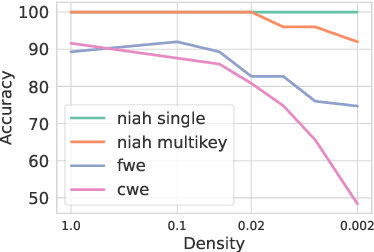
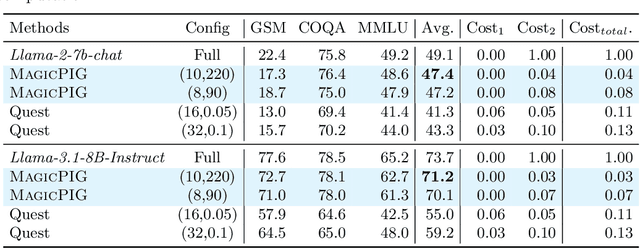


Abstract:Large language models (LLMs) with long context windows have gained significant attention. However, the KV cache, stored to avoid re-computation, becomes a bottleneck. Various dynamic sparse or TopK-based attention approximation methods have been proposed to leverage the common insight that attention is sparse. In this paper, we first show that TopK attention itself suffers from quality degradation in certain downstream tasks because attention is not always as sparse as expected. Rather than selecting the keys and values with the highest attention scores, sampling with theoretical guarantees can provide a better estimation for attention output. To make the sampling-based approximation practical in LLM generation, we propose MagicPIG, a heterogeneous system based on Locality Sensitive Hashing (LSH). MagicPIG significantly reduces the workload of attention computation while preserving high accuracy for diverse tasks. MagicPIG stores the LSH hash tables and runs the attention computation on the CPU, which allows it to serve longer contexts and larger batch sizes with high approximation accuracy. MagicPIG can improve decoding throughput by $1.9\sim3.9\times$ across various GPU hardware and achieve 110ms decoding latency on a single RTX 4090 for Llama-3.1-8B-Instruct model with a context of 96k tokens. The code is available at \url{https://github.com/Infini-AI-Lab/MagicPIG}.
Sirius: Contextual Sparsity with Correction for Efficient LLMs
Sep 05, 2024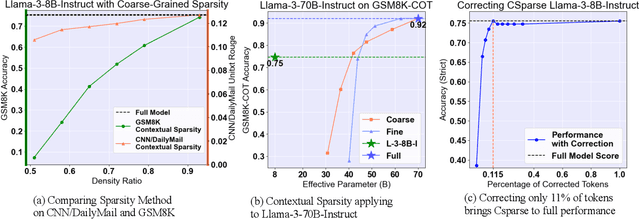
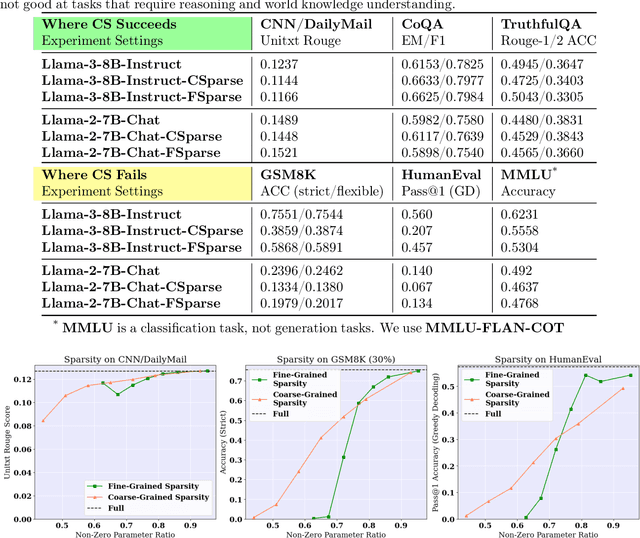


Abstract:With the blossom of large language models (LLMs), inference efficiency becomes increasingly important. Various approximation methods are proposed to reduce the cost at inference time. Contextual Sparsity (CS) is appealing for its training-free nature and its ability to reach a higher compression ratio seemingly without quality degradation. However, after a comprehensive evaluation of contextual sparsity methods on various complex generation tasks, we find that although CS succeeds in prompt-understanding tasks, CS significantly degrades the model performance for reasoning, deduction, and knowledge-based tasks. Despite the gap in end-to-end accuracy, we observed that sparse models often share general problem-solving logic and require only a few token corrections to recover the original model performance. This paper introduces Sirius, an efficient correction mechanism, which significantly recovers CS models quality on reasoning tasks while maintaining its efficiency gain. Sirius is evaluated on 6 models with 8 difficult generation tasks in reasoning, math, and coding and shows consistent effectiveness and efficiency. Also, we carefully develop a system implementation for Sirius and show that Sirius achieves roughly 20% reduction in latency for 8B model on-chip and 35% reduction for 70B model offloading. We open-source our implementation of Sirius at https://github.com/Infini-AI-Lab/Sirius.git.
MagicDec: Breaking the Latency-Throughput Tradeoff for Long Context Generation with Speculative Decoding
Aug 21, 2024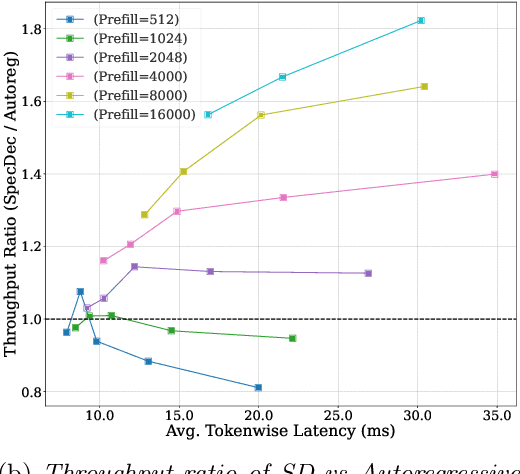

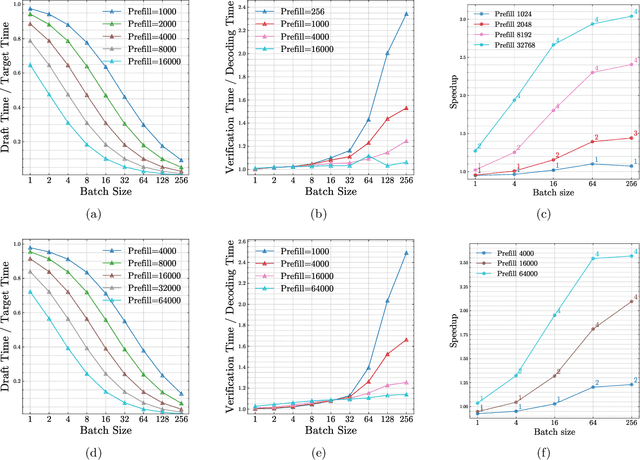
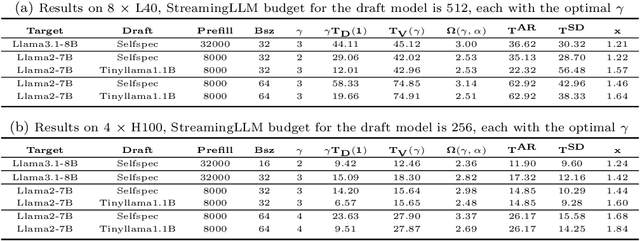
Abstract:Large Language Models (LLMs) have become more prevalent in long-context applications such as interactive chatbots, document analysis, and agent workflows, but it is challenging to serve long-context requests with low latency and high throughput. Speculative decoding (SD) is a widely used technique to reduce latency without sacrificing performance but the conventional wisdom suggests that its efficacy is limited to small batch sizes. In MagicDec, we show that surprisingly SD can achieve speedup even for a high throughput inference regime for moderate to long sequences. More interestingly, an intelligent drafting strategy can achieve better speedup with increasing batch size based on our rigorous analysis. MagicDec first identifies the bottleneck shifts with increasing batch size and sequence length, and uses these insights to deploy speculative decoding more effectively for high throughput inference. Then, it leverages draft models with sparse KV cache to address the KV bottleneck that scales with both sequence length and batch size. This finding underscores the broad applicability of speculative decoding in long-context serving, as it can enhance throughput and reduce latency without compromising accuracy. For moderate to long sequences, we demonstrate up to 2x speedup for LLaMA-2-7B-32K and 1.84x speedup for LLaMA-3.1-8B when serving batch sizes ranging from 32 to 256 on 8 NVIDIA A100 GPUs. The code is available at https://github.com/Infini-AI-Lab/MagicDec/.
MINI-SEQUENCE TRANSFORMER: Optimizing Intermediate Memory for Long Sequences Training
Jul 22, 2024



Abstract:We introduce Mini-Sequence Transformer (MsT), a simple and effective methodology for highly efficient and accurate LLM training with extremely long sequences. MsT partitions input sequences and iteratively processes mini-sequences to reduce intermediate memory usage. Integrated with activation recomputation, it enables significant memory savings in both forward and backward passes. In experiments with the Llama3-8B model, with MsT, we measure no degradation in throughput or convergence even with 12x longer sequences than standard implementations due to our careful memory optimizations. MsT is fully general, implementation-agnostic, and requires minimal code changes to integrate with existing LLM training frameworks.
SpecExec: Massively Parallel Speculative Decoding for Interactive LLM Inference on Consumer Devices
Jun 04, 2024Abstract:As large language models gain widespread adoption, running them efficiently becomes crucial. Recent works on LLM inference use speculative decoding to achieve extreme speedups. However, most of these works implicitly design their algorithms for high-end datacenter hardware. In this work, we ask the opposite question: how fast can we run LLMs on consumer machines? Consumer GPUs can no longer fit the largest available models (50B+ parameters) and must offload them to RAM or SSD. When running with offloaded parameters, the inference engine can process batches of hundreds or thousands of tokens at the same time as just one token, making it a natural fit for speculative decoding. We propose SpecExec (Speculative Execution), a simple parallel decoding method that can generate up to 20 tokens per target model iteration for popular LLM families. It utilizes the high spikiness of the token probabilities distribution in modern LLMs and a high degree of alignment between model output probabilities. SpecExec takes the most probable tokens continuation from the draft model to build a "cache" tree for the target model, which then gets validated in a single pass. Using SpecExec, we demonstrate inference of 50B+ parameter LLMs on consumer GPUs with RAM offloading at 4-6 tokens per second with 4-bit quantization or 2-3 tokens per second with 16-bit weights.
TriForce: Lossless Acceleration of Long Sequence Generation with Hierarchical Speculative Decoding
Apr 18, 2024Abstract:With large language models (LLMs) widely deployed in long content generation recently, there has emerged an increasing demand for efficient long-sequence inference support. However, key-value (KV) cache, which is stored to avoid re-computation, has emerged as a critical bottleneck by growing linearly in size with the sequence length. Due to the auto-regressive nature of LLMs, the entire KV cache will be loaded for every generated token, resulting in low utilization of computational cores and high latency. While various compression methods for KV cache have been proposed to alleviate this issue, they suffer from degradation in generation quality. We introduce TriForce, a hierarchical speculative decoding system that is scalable to long sequence generation. This approach leverages the original model weights and dynamic sparse KV cache via retrieval as a draft model, which serves as an intermediate layer in the hierarchy and is further speculated by a smaller model to reduce its drafting latency. TriForce not only facilitates impressive speedups for Llama2-7B-128K, achieving up to 2.31$\times$ on an A100 GPU but also showcases scalability in handling even longer contexts. For the offloading setting on two RTX 4090 GPUs, TriForce achieves 0.108s/token$\unicode{x2014}$only half as slow as the auto-regressive baseline on an A100, which attains 7.78$\times$ on our optimized offloading system. Additionally, TriForce performs 4.86$\times$ than DeepSpeed-Zero-Inference on a single RTX 4090 GPU. TriForce's robustness is highlighted by its consistently outstanding performance across various temperatures. The code is available at https://github.com/Infini-AI-Lab/TriForce.
Sequoia: Scalable, Robust, and Hardware-aware Speculative Decoding
Feb 29, 2024



Abstract:As the usage of large language models (LLMs) grows, performing efficient inference with these models becomes increasingly important. While speculative decoding has recently emerged as a promising direction for speeding up inference, existing methods are limited in their ability to scale to larger speculation budgets, and adapt to different hyperparameters and hardware. This paper introduces Sequoia, a scalable, robust, and hardware-aware algorithm for speculative decoding. To attain better scalability, Sequoia introduces a dynamic programming algorithm to find the optimal tree structure for the speculated tokens. To achieve robust speculative performance, Sequoia uses a novel sampling and verification method that outperforms prior work across different decoding temperatures. Finally, Sequoia introduces a hardware-aware tree optimizer that maximizes speculative performance by automatically selecting the token tree size and depth for a given hardware platform. Evaluation shows that Sequoia improves the decoding speed of Llama2-7B, Llama2-13B, and Vicuna-33B on an A100 by up to $4.04\times$, $3.73\times$, and $2.27\times$. For offloading setting on L40, Sequoia achieves as low as 0.56 s/token for exact Llama2-70B inference latency, which is $9.96\times$ on our optimized offloading system (5.6 s/token), $9.7\times$ than DeepSpeed-Zero-Inference, $19.5\times$ than Huggingface Accelerate.
 Add to Chrome
Add to Chrome Add to Firefox
Add to Firefox Add to Edge
Add to Edge